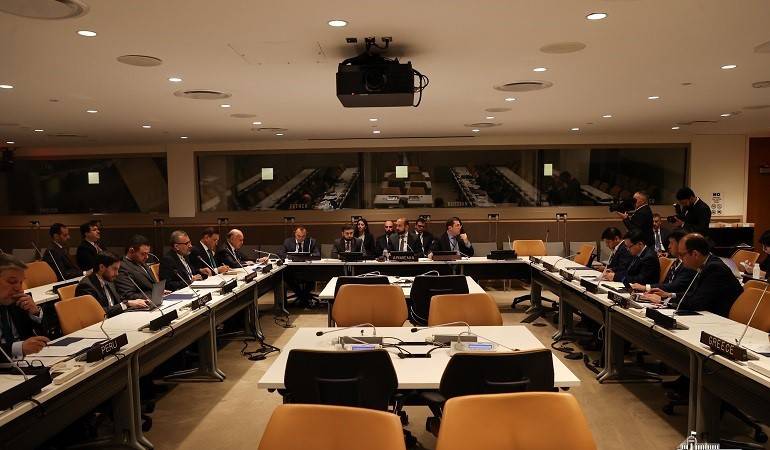Joint Press Statement of the Foreign Ministers’ Meeting of the Ancient Civilizations Forum on the margins of the 79th Session of the United Nations General Assembly
25 September, 2024The Foreign Ministers and their alternates of the member states of the Ancient Civilizations Forum, the Republic of Armenia, the People’s Republic of China, the Hellenic Republic, the Islamic Republic of Iran, the Republic of Iraq, and the Republic of Peru, held the meeting on 25 September 2024 on the margins of the 79th Session of the United Nations General Assembly. The meeting was chaired by Ararat Mirzoyan, Minister of Foreign Affairs of the Republic of Armenia.
The Ministers:
Reaffirmed the commitments enshrined in the Athens Declaration (2017) establishing the Forum and the Declaration of Tiwanaku (2018), the Beijing Declaration (2019); the Declaration of the Lima Forum of Ancient Civilizations (2020); the outcome of the fifth virtual ministerial meeting hosted by Peru (2021), the Baghdad Declaration (2022), the Tehran Declaration (2023) and stressed the key role of the Ancient Civilizations Forum as a platform for intercultural dialogue and cooperation among its member states, aimed at promoting their ancient heritage and fostering a culture of peace and non-violence.
Recalled the 70th anniversary of The Hague Convention for the Protection of Cultural Property in the Event of Armed Conflict (1954) as a key document for international cooperation on the protection and preservation of cultural heritage in times of armed conflicts, whether international or non-international.
Recalled all relevant resolutions of the General Assembly on promoting understanding, development, and exchange among civilizations and cultures, in particular the recently adopted resolution entitled International Day for Dialogue among Civilizations, recognizing that civilization achievements constitute the collective heritage of humankind, and encouraging dialogue among civilizations in order to promote international peace and security, human welfare, freedom and progress everywhere, as well as raising awareness of the value of the diversity of civilizations.
Emphasized that the unlawful destruction of cultural heritage, and the looting and smuggling of cultural property, including religious sites and artifacts, in the event of armed conflicts and the attempts to deny historical roots, cultural identity, and cultural diversity in this context can fuel and exacerbate conflict, thereby undermining the security, stability, governance, social, economic and cultural development of affected States and realization of human rights, in particular cultural rights.
Underscored the need to strengthen the cooperation aimed at protecting and promoting the historical and cultural heritage of their peoples, as the common legacy of the whole mankind.
Stressed that the preservation of the cultural heritage of ancient civilizations plays an important role in advancing tolerance, and non-discrimination, combating hate speech and xenophobia, and building just, peaceful, and inclusive societies.
Recognized the role of sustainable tourism including cultural and religious tourism in protection, conservation and management of their cultural heritage of outstanding universal value, including cultural and religious sites while achieving sustainable economic development.
Emphasized the importance of ancient civilizations in providing valuable collaborative solutions for the global challenges facing humanity today, in particular, climate change, water scarcity, poverty, and geopolitical tensions.
Emphasized the importance of addressing the underlying drivers of hate, violence and conflict to promote a culture of peace and called for promoting the virtues of interreligious and intercultural dialogue, respect for diversity of civilizations, inclusion, and human rights in advancing peace, security, and sustainable development and responding to global challenges.
Emphasized the need to strengthen cultural heritage resilience, to protect it from the effects of climate change and address its impact in a coordinated way, both at international and national levels.
Underlined that the digital sphere and its ongoing transformation are an important area for global action on building a culture of peace and highlighted also the significant role of new technologies in the monitoring, preservation and restoration of cultural heritage.
Welcomed the central role played by the United Nations Educational, Scientific and Cultural Organization in protecting cultural heritage and promoting culture as an instrument to bring people closer together and foster dialogue.
Expressed appreciation for the ongoing efforts of the United Nations Alliance of Civilizations in promoting a culture of peace through a number of practical projects in the areas of youth, education, media, and migration.
Emphasized the importance of the implementation of legally binding decisions of the International Court of Justice, related to the prevention and punishment of acts of vandalism directed against cultural and religious heritage.
Supported engagement with civil society and other relevant stakeholders, including non-governmental organizations, national human rights institutions, religious leaders and faith-based organizations, indigenous peoples, women’s organizations, youth, media, and private sector in promoting the values of the culture of peace, tolerance, and respect for religious and cultural diversity.
Agreed that strengthening of capacities of the Ancient Civilizations Forum will raise its visibility in the international fora and enable stronger, more coherent, and efficient cooperation among its member states.
The Ministers thanked the Islamic Republic of Iran for hosting the 7th Ministerial Meeting of the Ancient Civilizations Forum and expressed support for the Republic of Armenia to host the 8th Ministerial Meeting of the Ancient Civilizations Forum in Armenia on 18 December 2024.


